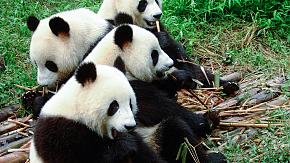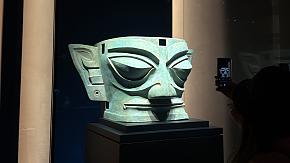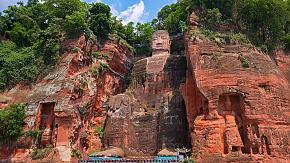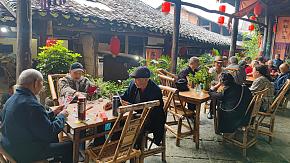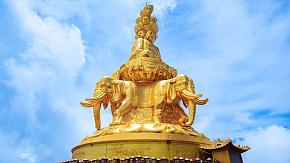What to See in Chengdu
Chengdu is endowed with plentiful natural resources and sites of historic interest. The city of Chengdu is home to China's living treasure, the Giant Panda, as well as many other endangered species. With a history of over 2,400 years, it is home to many amazing historical sites and archaeological wonders, and Chengdu's local cuisine is world-renowned for its delicious spiciness. The life pace in Chengdu is slow, and many Chengdu citizens idle away the afternoons by drinking tea and playing cards in one of Chengdu's many tea houses.
 Tea House in Chengdu
Tea House in Chengdu
The Sanxingdui Museum
With its ancient history, Chengdu is the perfect place for history lovers or those who simply love to see beautiful places. The Sanxingdui Museum exhibits artifacts unearthed at the Sanxingdui archaeological site. The bronzes uncovered at the site astounded the world with their size and high level of artistic achievement. It was one of the most important archaeological discoveries of the twentieth century.
The Zigong Dinosaur Museum
The Zigong Dinosaur Museum, located 11 kilometers from Zigong City, is one of the world's three largest dinosaur museums and the first specialized dinosaur museum in China. Zigong City has become famous for its large deposits of dinosaur fossils. The museum was built on the largest archaeological site. It is where the majority of the dinosaur fossils exhibited in the museum were unearthed. The majority of the fossils uncovered in the area are from the mid-Jurassic period, making them extremely rare and important to paleontologists.
 The Zigong Dinosaur Museum
The Zigong Dinosaur Museum
Ancient Temples
For lovers of architecture, Chengdu has many ancient temples for visitors to explore. Built in the Tang Dynasty (618-907), the Qing Yang Gong Temple is the oldest and largest Taoist temple in southwest China. According to legend, it is the birthplace of the founder of Taoism, Lao Tsu, and is where he made the first sermon on Taoism. It is a beautiful and peaceful place for visitors to wander and enjoy the atmosphere and architecture of this ancient temple. The Wuhou Temple of Chengdu has been famous for visitors to Chengdu for centuries.
It is renowned as the sacred place of the Three Kingdoms (220-280AD) and is a wonderful example of the Three Kingdom's architecture. East of Wuhou Temple is Jinli Old Street, a perfect place to discover Chengdu's indigenous arts and culture. If you have free time, you can explore the Wuhou Temple in your own way. Wenshu Temple has a history of over 1,000 years and is the largest and best-preserved Buddhist Temple in Chengdu. Wenshu Temple is known for its collection of ancient sutras, paintings, and calligraphy, as well as its cultural treasures. This temple has been a popular destination for visitors and pilgrims for many centuries. Other than its religious features, Wenshu temple is famous for its teahouse and vegetarian restaurant, which are very popular with locals. It is the perfect place to experience the real, local Chengdu lifestyle.
The Leshan Giant Buddha
The Leshan Giant Buddha Scenic Spot, located in the suburbs of Leshan City, has the largest Buddha carving in the world. Carving of this giant statue was begun in the Tang Dynasty and continued for over ninety years. Besides the Giant Buddha, the Leshan Giant Buddha Scenic Spot is home to many temples and nature spots. It is an extremely beautiful area and a testimony to man's creative ingenuity.
 The Leshan Giant Buddha
The Leshan Giant Buddha
The Giant Pandas
Besides its history, Chengdu is famous for its natural resources and for being home to China's giant panda. At the Wolong National Nature Reserve, visitors will not only get to see the giant panda in its research facility, where scientists study their behavior and breeding habits, but also get a chance to see the giant panda in its natural habitat. Wolong National Nature Reserve's breeding program has been so successful that over ten percent of the world's giant pandas were born at this location. The Chengdu Research Base of Giant Panda Breeding, located closer to downtown Chengdu, is another breeding center for China's giant pandas. The breeding center emphasizes education about China's endangered species and its habitat. The facility has a Giant Panda Museum, as well as large enclosures where visitors can see the giant panda.
 Giant Pandas in Chengdu
Giant Pandas in Chengdu
Mount Emei
Mountain lovers, the misty Mt. Emei, located in Leshan City, 150 km away from Chengdu, is one of China's best-known summer destinations due to its pleasant weather, gorgeous natural scenery, and ancient Buddhist architecture. Emei Shan is one of the four Buddhist sacred mountains of China characterized by ancient pines, clean brooks, and picturesque waterfalls. Standing on the summit, visitors can enjoy an unforgettable view of snowy mountains and vast plains in the distance. Mt Emei was added to UNESCO's Natural and Cultural Heritage List in 1996.
Jiuzhaigou Valley
Jiuzhaigou Valley, eulogized as a world of magical fairytales, has for years enchanted tourists with its mountains and luxuriant forests, colorful lakes, gushing waterfalls, and abundant wildlife. To its south is the Huanglong (Yellow Dragon Scenic Area). Jiuzhaigou Valley is located in Nanping County, 450 kilometers (about 280 miles) to the north of Chengdu City, Sichuan, covers a total area of 720 square kilometers, and the valley is 50 kilometers in length. In 1992, UNESCO added this scenic area to the world natural heritage list.
Sichuan Opera
Chengdu has many unique ancient and modern cultural aspects that can be found nowhere else, but it also has a jumping nightlife. Being a transportation hub and the gateway to Tibet since the ancient Silk Road, Chengdu's unique culture is a melting pot of different cultures from throughout China and Western Asia. Sichuan Opera is an important part of Chengdu culture and one of the contributing styles that became Beijing's famous Peking Opera. Besides normal singing and martial arts, Sichuan Opera has many unique features that set it apart, such as fire breathing, changing faces, and juggling pottery. Sichuan Opera is far less formal in style than Peking Opera.
Teahouses
Chengdu has a lively bar scene. Areas such as Renmin South Road and west of Yangshi Street feature many cafes, discos, and karaoke bars. These nightspots are good places to meet other travelers and exchange stories or make friends with local residents. A very important part of Chengdu's residents' daily life is the tea house. Visitors will find there are a lot of teahouses scattered throughout the city. Drinking tea has become a quintessential part of Chengdu people's daily life. Because of this, Chengdu has formed a special tea culture all its own, which attracts visitors from across China and around the globe. One of the most unique parts of Chengdu's teahouses is the community atmosphere. Everyone from infants to the elderly comes to the teahouses to relax, do business, chat with friends, or just drink tea. Many elderly come to the teahouses early in the morning and do not leave until late at night. Normally, when somebody decides to leave, they give what remaining snacks they have to the table next to them. It is a place where new friendships are made. There are people wandering the teahouses offering to clean out patron's ears or cut their fingernails. They wander through the crowds with handfuls of metal tools that they use. It may look a little scary, but it is a wonderful experience. Chengdu has one of the few remaining bastions of true teahouse culture left in China. It is a wonderful experience for Locals and visitors. It is something that should not be missed because the only way to truly understand it is to experience it.
Local Cuisine, Xiaochi
The local cuisine of Chengdu is famous throughout China for its delicious spiciness. Most of Chengdu's local food specialties started out as snacks or Xiaochi (small eats). They originated in little stands or stalls located on the sides of the road. Being located in Sichuan Province, Chengdu's local specialties are famous for their delicious spiciness. Sichuan Province is one of the four famous local cuisines in China. There is a Chinese saying "All good foods are found in Chengdu". Chengdu's foods have become famous throughout China, and their renown has recently been spreading into Western countries. Many locals and visitors to Chengdu enjoy walking down the street and stopping at the individual stalls to buy one or two items, eat as they continue their walk, and pick up some more of the tasty local dishes further on down the street. For visitors who do not like spicy food, most dishes can be prepared without chili.
Chunxi Road
Chengdu, like all major Chinese cities, is a shopper's paradise. As a gateway to Tibet, Chengdu has been a center for commerce for centuries. Marco Polo even mentioned Chengdu. Shoppers in this city can purchase anything from name-brand fashions and electronics to local arts and crafts. It is a wonderful place for visitors to get souvenirs that cannot be found anywhere else in the world. The Chun Xi Lu shopping district is the hippest and most popular shopping district. It is quite large and is a pedestrian street, which means that no vehicles are allowed on it, making it a safe place to stroll and do a bit of window shopping. Chun Xi Lu's tall and modern shops sell modern fashions, electronics, and jewelry. There are also many restaurants and small snack stands that sell Chengdu's famous local cuisine. Chengdu's He Hua Ci wholesale shopping district is where individual shoppers and wholesale buyers from other shops go for their needs. This market is so large that it would take several days to see everything. The night market, located near the Jiang Hotel and the Minshan Hotel, has a great atmosphere and is a great place to pick up souvenirs. This market offers everything from embroidered silk to statues of Chairman Mao.
Jinli Old Street
The Jinli Old Street was designed in the style of The Qing Dynasty. The workers and clerks on Jinli Old Street are all dressed in traditional Chinese costumes. This street is a wonderful place to get authentic local arts and crafts, and many sellers demonstrate how these items are crafted. The evening is when Jinli really comes to life. The streets are lit with traditional red lanterns, and the locals come out to walk the street and do some window shopping.
Related Posts You May Like
What Our Clients Say
"Great Customized Service", "Trip of A Lifetime", "Exceed All Expectations"

